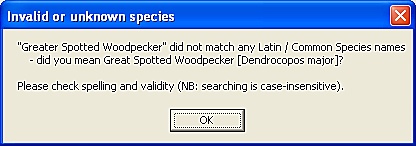When adding a new Observation, you may occasionally find that the species name you have used does not match any of the name variants in the species database, generating an error:

There are a number of possible reasons why a species name is not recognised - this page provides a guide to understanding the cause.
1. Simple mis-match errors
In the majority of cases the Species name is not recognised due to a simple discrepancy caused by:
- spelling mistakes or transliterations, or;
- using a slightly different variant of the species name.
These cases are generally easily recognised as the software suggests the closest-matching alternative (as in the example above), allowing you to quickly correct the entry. Scientific (Latin) names are particularly prone to this type of error.
2. Alternative names
In some cases the Species name may be an alternative name that is not included in the Species database. This applies equally to common and scientific names - often there are a number of alternative common names and regional variants, whilst scientific names frequently include synonyms as a result of taxonomic revisions over time.
A number of approaches are available to identify such species:
- The Species database provides a range of name-search facilities, and will match individual tokens within a species name. It also includes a powerful inexact ('fuzzy') matching mode, which will identify similar names and alternative spellings.
- The Taxon database allows you to identify species by working progressively through the taxonomic tree to family level, where relevant species are listed.
- Internet search engines (eg. Google, Bing) can be used to resolve alternative species names, by reviewing relevant species information.
If you frequently use an alternative species name that is not included in FieldNotes Species database, please report it to us for future incorporation.
3. Rarely reported species
For clarity, FieldNotes uses a version of the Species database containing the more commonly reported species in the UK (about 12,000 of some 55,000 species). To record infrequently-reported species you will need to use the full Species database distributed with FieldNotes. The guide to Switching Databases contains relevant information.